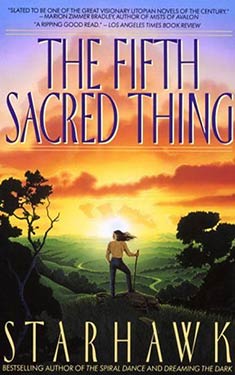Starhawk
Completed 12/21/2019,
Reviewed 12/21/2019
4 stars
I was first introduced
to Starhawk in Matthew Fox’s “Original Blessing”, a book about Creation
Spirituality. She had written several
books on the topic as well on Goddess worship.
This is her first work of fiction.
It encapsulates a lot of the spirituality she espouses in the context of
a future utopian society fighting against a dystopian power trying to overtake
it. It took a long while for me to get
into the book, but I found myself drawn in by the world building and eventually
became very engaged with it. It won the
Lambda Literary Award in 1994.
 The utopia
of the book is in what was formerly known as San Francisco. Everyone is free, everyone has a voice in
what is going on, everyone works at what they want to do, and everyone pitches
in to help each other. Racial and religious
diversity are supported. Most people are
polyamorous. This is counter to the
oppressive regime in the dystopia to the south, where women and minorities are
repressed, sexual diversity is punished, and everyone must conform to the
purity laws. Those who transgress
against the norm are told they have lost their immortal soul and are conscripted
into the army or sexual slavery.
The utopia
of the book is in what was formerly known as San Francisco. Everyone is free, everyone has a voice in
what is going on, everyone works at what they want to do, and everyone pitches
in to help each other. Racial and religious
diversity are supported. Most people are
polyamorous. This is counter to the
oppressive regime in the dystopia to the south, where women and minorities are
repressed, sexual diversity is punished, and everyone must conform to the
purity laws. Those who transgress
against the norm are told they have lost their immortal soul and are conscripted
into the army or sexual slavery.
The plot of
the book isn’t that ground breaking and at times, I found it a little
boring. But Starhawk makes it all very
real with warm, simple prose. I found
myself enjoying every return to the pages of the book, even when I felt like I
didn’t know where the plot was going.
The
characters were all very well drawn. And
the two main characters are black, which I found very refreshing. Madrone, one of the main characters, is a
healer witch. She works with the local
doctor to heal through spiritual energy and herbal concoctions. One of her lovers, Sandy, just died from an
epidemic that ran through the community, which may or may not have been
biological warfare from the south. One
of her other lovers is Bird. He’s been imprisoned
in the south for ten years and it is not known if he’s alive or dead. The story follows the two of them in
alternating chapters for most of the book.
The one
fault I have with the book is that it didn’t seem to really move. Reading it was a slow process with little
direction towards where it was intending to go.
Now that’s not to say that there was not action, because there was. It just didn’t have any urgency. That was why I needed the first hundred pages
or so to get into the book. I had to be immersed
in the world and the characters before I started to care for them. Eventually, I was, and I couldn’t stop
reading it, even at that slow pace.
The book has
a lot to say about what we could be doing to make this world a better
place. Peace, love, acceptance,
patience. And the passive resistance
tactic when the army from the south comes to invade the utopia is really quite
impressive. I found it quite profound,
especially because the choice between passive and active resistance is debated
quite a lot throughout the invasion.
I was going
to give this book three stars at first, but I found myself really enjoying the
heck out of it. I had come to be totally
immersed in its world, appreciating the characters and the philosophy it
expounded. I finally had to admit that
it was really a four star out of five book.
Some may find it a little dated with concepts that came to the forefront
during the New Age movement, but it describes many truths about human nature
and what we can achieve if we can just get along.
No comments:
Post a Comment